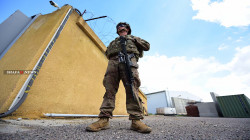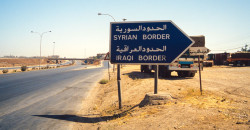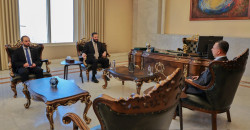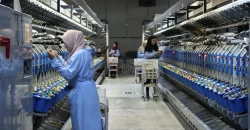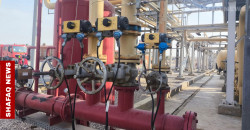Beyond Sanctions: New chapter for Syria, new opportunities for Iraq

Shafaq News/ Syria has entered what observers are calling a "historic moment" after US President Donald Trump announced the removal of long-standing economic sanctions on Damascus.
The decision, revealed during his visit to Riyadh and reportedly taken at the behest of Saudi Crown Prince Mohammed bin Salman, aims to open the door for Syria’s economic rehabilitation after more than a decade of devastation caused by civil war and external interventions.
The announcement has already stirred diplomatic and economic circles across the Middle East, with regional actors anticipating a domino effect in reestablishing economic ties with Damascus and reintegrating Syria into broader Arab and international frameworks.
Syria’s Path to Economic Recovery
The implications for Syria itself are far-reaching. According to economic analyst Diaa al-Mohsen, the country is poised to receive inflows of capital and foreign investment to rebuild its war-torn infrastructure.
"This will increase Syrian exports and generate more foreign currency revenues," he told Shafaq News.
Al-Mohsen noted that the lifting of sanctions will simplify financial transactions, encourage trade, and improve living standards through job creation and lower consumer prices.
Former Jordanian Minister of State for Media Affairs, Samih al-Maaytah, framed the development as Syria's reentry into the global order.
“This move signals Syria’s return to the international community, both politically and economically. But it also places responsibility on the Syrian state to seize this opportunity and make meaningful progress on all fronts,” he told Shafaq News.
Al-Maaytah underscored that the decision removes long-standing barriers for neighboring and international actors who have struggled to support Syria due to sanctions. Now, these countries, according to himn, can move forward with energy, trade, and infrastructure partnerships without legal or financial obstacles,” he added.
From inside Syria, economic researcher Hayan Hababa emphasized that the sanctions relief should not be viewed as a reward but rather as “a moral and humanitarian duty to compensate for years of war and decades of repression.”
He described to Shafaq News the shift as Syria’s transition from a “war economy” to one aligned with international standards.
“This change will enable foreign remittances and open the door to imports and international trade, breaking the economic siege.”
According to Hababa, the potential benefits include the return of expatriate capital and skilled labor.
“Eased financial transfers and restored foreign ties will encourage the return of Syrian investors and professionals,” he said.
“We’re looking at the possible emergence of independent banks under proper regulatory oversight, new markets for goods and services, and the creation of tech-driven industries.”
Such developments, he argued, would reduce unemployment, increase exports, and strengthen the Syrian pound.
“We may also see a resurgence in agriculture, livestock, and tourism—sectors that together account for roughly 18% of Syria’s GDP,” he added. Energy infrastructure, including oil wells and gas facilities, could also be restored and made export-ready.
A Regional Realignment in the Making
Jordanian international relations researcher Hazem Ayad described the US decision as a catalyst for regional transformation.
“This is a first step toward broader Arab and international openness to Syria,” he told Shafaq News, noting that European and global engagement could follow.
Still, Ayad warned that the process must pass through US congressional channels for full enactment.
“That will take time, but it won’t stop regional states from initiating their own steps toward normalization with Syria.”
He also argued that the decision could generate momentum for Syria's internal development and bolster its sovereignty, as it may weaken separatist agendas—especially those of the Syrian Democratic Forces (SDF), which relied heavily on US backing to strengthen their negotiating position against Damascus.
Ayad added that the move could also undercut Israeli influence in Syria.
“Israel has long counted on US sanctions to maintain leverage in the Syrian file, particularly with its occupation of parts of southern Syria. Now, that strategic cushion is eroding.”
Iraq Set to Reap the Benefits
In Baghdad, the decision was met with cautious optimism, especially among economic and financial experts who believe it could significantly ease pressure on Iraq’s financial system and offer new trade opportunities.
Mustafa Hantoush, a financial and administrative affairs researcher, told Shafaq News that one of the major impacts of lifting the sanctions is reducing the smuggling of US dollars into Syria.
Since 2004, Iraq has battled persistent capital flight and illicit dollar transfers—many masked as legitimate commercial transactions. These operations, often linked to sanctioned entities including the former Syrian regime have prompted international scrutiny and sanctions against multiple Iraqi banks.
Hantoush further explained that the easing of restrictions could curb the influx of undocumented Syrian laborers into Iraq and raise the prices of Syrian imports—an outcome with mixed effects.
“While it’s negative for traders who rely on cheap Syrian labor and goods, it’s beneficial for local industry,” he said. “Additionally, it may facilitate the return of thousands of Syrian refugees residing in Iraq.”
According to Iraq’s Ministry of Labor and Social Affairs, there are currently between 270,000 and 310,000 Syrian refugees in the country. Ministry spokesman Hassan Khawam revealed in a press briefing that 5,544 Syrian workers are officially registered, adding that many more enter Iraq under tourist, religious, or medical visas before entering the informal labor market.
Beyond labor dynamics, Hantoush emphasized that “Iraqi companies now have a real opportunity to take part in Syria’s reconstruction,” a sentiment echoed by Diaa al-Mohsen.
“This decision will reduce import costs when Syrian products become more readily available, benefiting the Iraqi market by lowering prices for certain goods,” al-Mohsen said.
He added that Iraqi firms—especially in construction and raw materials—could play a leading role in rebuilding Syria’s shattered infrastructure.
A senior official in Syria’s Ministry of Economy and Industry revealed to Shafaq News that Syria intends to build a new stage of recovery and stability with Iraq as a primary partner.
“Iraq and Syria have shared history and economic interdependence. This decision allows us to deepen that relationship to mutual benefit,” the official stated.
